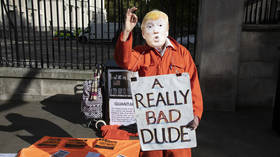Behavioural scientists confirm relaxing of Covid lockdown at Christmas is a cynical way to impose even tougher rules in new year
Scientists know that plans to ease lockdown at Christmas will cause more deaths, but they judge it worthwhile as it’ll make the populace more compliant long term. It’s all part of the effort to control how Brits view the virus.
On November 24, the UK government announced plans to relax coronavirus restrictions significantly between December 23 and 27, with up to three households permitted to mix in a combined ‘bubble’, allowing families to reunite over the holiday period.
While warmly received in certain quarters – The Daily Express reported the move as “Boris Johnson battles experts to save Christmas” – the proposals sparked outcry among many members of the scientific community. On November 28, former chief scientific adviser David King suggested families needed to isolate for at least ten days before Christmas if they wished to celebrate the occasion with elderly relatives, due to alarming infection rates among children.
“You need to be exceptionally careful in a multi-generational situation, indoors at home, celebrating with a glass of champagne or whatever else, as attractive as all of that is,” King said. “It’s a very dangerous situation. There will be a price to pay for Christmas. We do all have to realise that we are putting members of our own family at risk in this process.”
Also on rt.com Johnson urges MPs to back UK’s regional tiered system amid criticism within his own partyMany cases among younger people are asymptomatic, meaning the virus could be unwittingly transmitted to vulnerable individuals in an enclosed environment with ease. The prospect of transmission is likely to be amplified by the vast numbers travelling to other parts of the country to see relatives during the Christmas and New Year period.
Recorded cases of coronavirus are falling in the UK, but infections are rising significantly among schoolchildren, with one in five – 900,000 – not in class presently, as they either have the disease or are isolating with symptoms. That’s a 50-fold increase on September. One in 100 state schools are closed entirely, and 11- to - 16-year-olds now have the highest levels of infection in England.
“There’s no doubt Christmas will increase cases and result in deaths,” Professor Gabriel Scally, former regional director of public health for South West England, has warned.
Manufacturing public consent
Given the grave risks involved in pausing lockdown at such a critical juncture and effectively encouraging the intimate mixing of at-risk individuals with undiagnosed coronavirus carriers and, in turn, raising the probability of a third lockdown, the government’s actions seem hare-brained and reckless.
However, Whitehall’s potentially fatal irresponsibility is morbidly explicable given the findings of a report issued on October 29 by the Scientific Pandemic Influenza group on Behaviour (SPI-B) – a behavioural scientist collective employed by the Scientific Advisory Group for Emergencies, known as SAGE.
Titled ‘SPI-B: Insights on Celebrations and Observances during COVID-19’, the paper noted pandemic restrictions had already “impacted celebrations and observances, including Good Friday, Easter, Eid ul Adha, Rosh Hashana and more” and, as coronavirus “will continue to be a challenge for many months”, it was “important to rethink the nature of celebration and observance during the pandemic.”
“The behaviours that combine to form celebrations and observances hold emotional value and significance... An extension of existing social bubble rules is likely to create high legitimacy for government interventions as the government will be seen to care about what people most value during celebrations – their connection to friends and family,” the paper stated.
In other words, Whitehall’s policy is designed to engender public trust in and sympathy for the government, humanising officials in the process. Such “high legitimacy for government interventions” will in turn surely soften the blow of a subsequent lockdown – which, in a perverse irony, the relaxation of rules over Christmas will almost inevitably necessitate, of course.
The inherently manipulative nature of the expanded “bubble” rules was amply underlined by Professor Stephen Reicher, a member of SPI-B, in a Guardian op-ed published on November 30.
Noting “five days of mixing at Christmas will inevitably lead to more deaths in the New Year,” Reicher pondered the question of whether it was “best to insist that people cannot meet up in their houses, with the risk that many will simply ignore such regulations” and, in doing so, “destroy any vestiges of trust between the government and the public,” or “better to bend towards people’s desires a little in the hope of retaining some level of control?”
“If ministers simply issue edicts, they’ll be seen as out of touch with the realities of many people’s lives. Orders to ‘open your windows to stay safe’ will achieve little more than widening the perceived distance between politicians and the public,” Reich wrote. “But if the government shows an understanding of the reality in which many live, and offers them support, that chasm can begin to be bridged.”
Beware of trolls
A boost in public support would undoubtedly be most welcome to Downing Street at present. Trust in Prime Minister Boris Johnson has fallen from a high of 35 percent in April to just 26 percent as of November 30, and poll ratings for his administration have diminished precipitously in the same period. In April, the government enjoyed stratospheric leads of up to 21 percent, while, today, the Labour Party has comfortable leads, according to most polls.
It may be significant that in the days after the Christmas relaxation was announced, the Times reported that the British Army had mobilised its elite defence cultural unit, part of its 77th Brigade psyops initiative, to counter ‘online propaganda’ relating to coronavirus.
Also on rt.com Proof of Covid vaccination could be key to getting back into bars, cinemas & other venues, UK minister saysThe unit was launched in Afghanistan in 2010 and merged into the 77th Brigade in 2015. Internal documents cited by the Times allegedly indicate its operatives are monitoring cyberspace for coronavirus-related content, and analysing “how messages flow around the world, who’s viewing messages, reacting and then spreading them to other people.”
This is to be augmented by concurrent efforts from the Cabinet Office’s Rapid Response Unit, the Army, and UK signals intelligence agency GCHQ.
While the Times quoted a Ministry of Defence spokesperson as saying these capabilities were “not directed at the UK population” and “77th Brigade do not, and have never, conducted any kind of action against British citizens”,previous disclosures cast doubt on these pronouncements.
At a Downing Street briefing in April, General Sir Nick Carter, the UK’s most senior military officer – and secretly the former ‘Honorary Colonel Commandant’ of 77th Brigade – outlined the various ways in which the military was supporting the government, noting that the Brigade was “helping quash rumours from misinformation, but also counter disinformation.”
There are strong indications this has comprised the dissemination of pro-government messages, and the discrediting of those critical of Whitehall’s handling of the pandemic. Downing Street’s lackadaisical approach has meant the country ranks seventh in the world in terms of cases (1,643,086) and fifth in terms of deaths (59,051).
Also on rt.com Tequila bar registers as church in bid to outwit Covid-19 lockdown rulesSuch information-warfare capabilities may have been targeted internally in other insidious ways. In February, SPI-B issued a paper on how to increase public adherence to social distancing measures during the pandemic. One solution offered by the group was to increase the “perceived level of personal threat” among British citizens.
“A substantial number of people still don’t feel sufficiently personally threatened,” the document stated. “The perceived level of personal threat needs to be increased among those who are complacent, using hard-hitting emotional messaging.”
It went on to recommend such messaging be circulated via “targeted media campaigns, social media, apps and websites” – precisely the realm of the shadowy 77th Brigade.
Think your friends would be interested? Share this story!
The statements, views and opinions expressed in this column are solely those of the author and do not necessarily represent those of RT.















